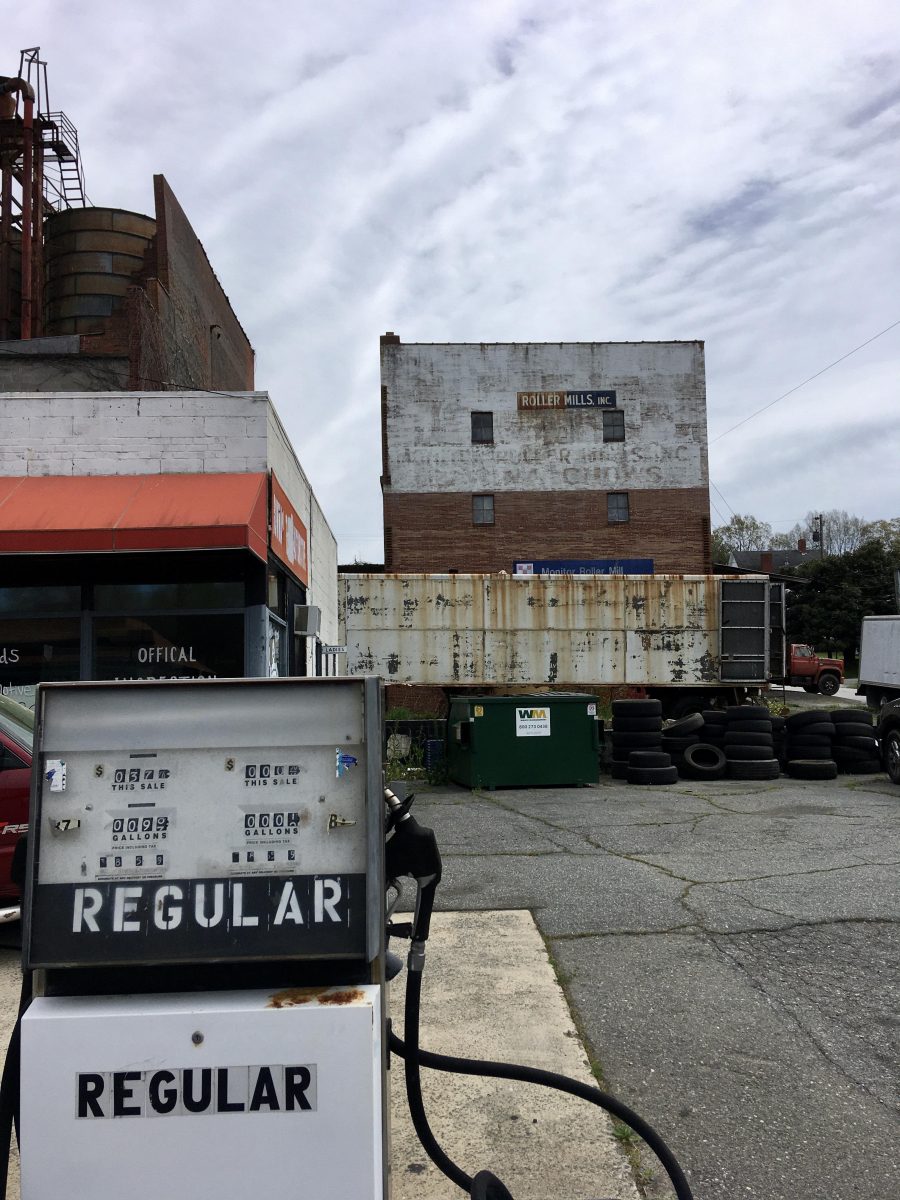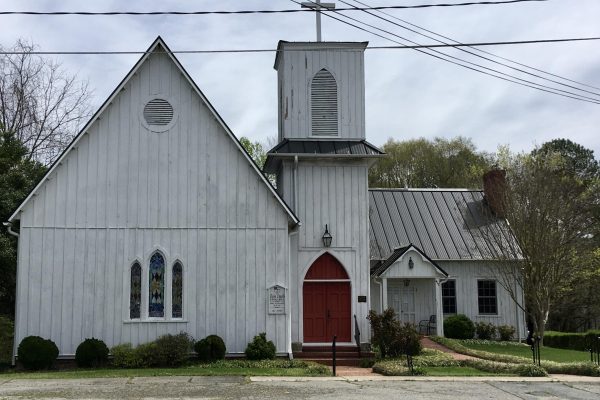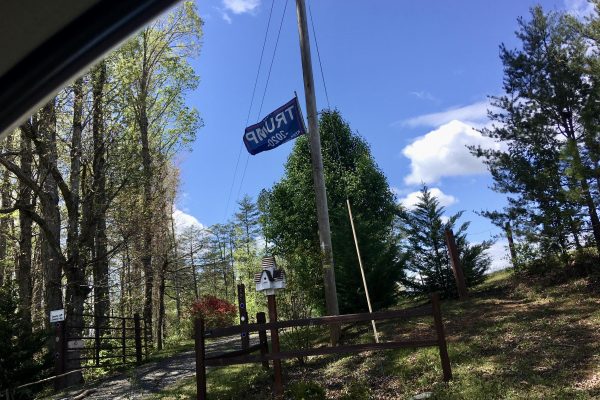When Scotland-based writer, and Wigtown Festival regular, Ken Ilgunas got stuck in rural America because of the virus, he never expected to become friends with survivalists, preparing for Armageddon.
In this eye-opening essay, he reveals a lockdown less ordinary, assault weapons included.
---
I’m an American who lives in Scotland and who got stuck in America because of the pandemic.
I was on a short speaking tour at high schools and colleges in North Carolina when America was locking down and my flight home got canceled. It just so happened that I used to live in North Carolina and that I had a friend here, so I suggested to my wife that we head to my pal David’s home in a half-rural, half-wild part of the state in the forested foothills of the Appalachian Mountains. I knew it would be the perfect spot to hunker down.
David lives in Stokes County, near the Virginia border, about an hour from the mid-sized cities of Greensboro and Winston-Salem. Here, there are about three “No Trespassing” signs per capita, the median age looks like it’s about 67, and one-syllable curse words are drawn out into raspy haikus. Imagine rolling country roads, woods colored every shade of green, clay-red soil soon to sprout rows of cabbage heads, and farmer-tanned arms dangling out the windows of well-polished pickups. It’s thoroughly Southern, Christian, and conservative. In 2016, 76 percent of Stokes voters voted for Trump.
On a dead-end gravel road, David has five acres of land. He moved out here about thirteen years ago to live out his retirement in a small, steep-roofed Gothic revival cottage that he built, which he calls “Acorn Abbey.”

Acorn Abbey
Astrid Jaekel

Acorn Abbey has the feel of a monastery, if a heretical one. Books have been written here (including all three of mine), periods of silence are voluntarily observed, and the names of Augustine and St. Patrick are frequently mentioned, but only with contempt. There are teetering towers of books, a Rodgers organ that booms Bach and show tunes, and a vegetable garden and orchard.
David lives with his cat Lily, who never got along with me and who, according to David’s analysis, has a separation anxiety disorder due to having been abandoned by her mother as a kitten. Lily’s complicated psychology has left her with a cloying neediness for David and a resentment for all other living creatures. But even a cat could evolve, I’d learn. When I greeted Lily, she didn’t respond with her characteristic hiss. Instead, she just slowly walked out of the kitchen.
Part of David’s reason for choosing these woods was that he’d be well situated here in a doomsday scenario. There’s a creek, lots of trees, game, and a defensible geographic position. And there’s a good hospital and grocery store within an hour’s drive.
David’s had two homes that have burned down and one that has flooded (all were freak accidents, not of his own making). These tragedies have probably contributed to his need to prepare for the worst and confirmed that doomsdays, big and small, do happen. He was a newspaper man in earthquake-prone San Francisco for eighteen years and he remembers how boxed in he felt after 9/11, when military units were positioned on each side of the Golden Gate Bridge. Ever since then he’s been a doomer, a survivalist, a prepper.
Preppers have plenty to worry about: everything from climate change, to an economic collapse, to a nuclear detonation, and to a pandemic. In a world that was getting warmer, more complex, and more populous, the sparsely-populated woods of David’s home state became ever more inviting.
David calls himself a “liberal prepper,” which is a rare subgenus of prepper, who tends to be less fixated on stockpiling guns and more on developing community.
He’s outfitted the house with tools, obsolete (but possibly useful?) communications equipment (HAM radio, walkie talkies, HF transceivers), buckets of dehydrated food (beans and prepackaged meals with a storage life of up to 25 years), a dosimeter, Geiger counter, Iodine, survivalist books, first aid kit, canning equipment, well bucket, storage seeds, solar panel, as well as some other definitely-not-for-Doomsday things, like his enormous 204-piece collection of dinnerware. When I lived here, I was always happy to play along. Prepping, I’ve learned, is fun.
My wife, Astrid, is German. She’s lived in cities like Edinburgh and Frankfurt for most of her life, and I wondered what she’d think of Acorn Abbey and rural North Carolina and all the eccentrics who live here. I never really got to know the neighbors, as everyone keeps to themselves, but we knew of Dwight, who allegedly lives in his barn, and Clara, a retired teacher, who has a tendency for upending and getting stuck beneath her ATV. Another guy used to have a big confederate flag with a bass fish in the middle of it, but he’d moved out.
I wanted Astrid to like it here because we’re in the process of house hunting in Scotland and in the middle of a long conversation about whether we want to stay near the opportunities and culture of Edinburgh, or if we should find peace and quiet (and more affordable prices) in the countryside. A good experience in rural America might help us decide.
Astrid had complained that on our last trip to America that she never got to see the “real America,” where all the guns, obesity, and grotesque anti-abortion signs are that I’d promised. I’d taken her to Vermont, where all she got to see were Middlebury stick figures wearing expensive hiking clothes at farmers markets.
I was worried that rural North Carolina might be too real. On the way to David’s, we drove past confederate flags, obscenely big blue “Trump 2020” flags (I don’t remember seeing any “Obama 2012” flags), decrepit barns, abandoned single-wides (homes built in factories that are trucked to their destination), and lots of “Thank You Jesus” lawn placards, which seemed to pop up after the 2016 election. That was almost four years ago, and the county has shown no material improvement, but the signs, thanking Jesus, nevertheless remain up. On the last mile home, Clara’s white pit bull and a dark mongrel cur ran alongside our vehicle barking at our tires.
Upon arriving, the Abbey house looked just as it did when I left three years ago. But the grounds brought to mind the gardens of Miss Havisham in Great Expectations, which the protagonist, Pip, describes as a neglected “wilderness.”
All the chickens I raised years ago, save for the last one (which was relocated to another home), were killed by predators. There are about twenty fruit trees in the orchard, some of which couldn’t be found inside of mini jungles of copel and spiky locust trees. One peach tree was completely dead. Honeysuckle vines were pouring over one side of the orchard fence and smothering apple trees. One pear tree had toppled and was sending ridiculous shoots skyward from its now-curved trunk.
The vegetable garden was a tall-grass prairie. I had to step high to push dead weed stalks down with my boots while making a breast-stroke motion with my arms to push spiderwebs out of my face. David said he always wanted a wild “art nouveau” look about the place, and I wondered if this was what he meant.
Despite the mess, I realized I missed this place. I missed how alone I could feel here. No one knows where Stokes is, even people from North Carolina. I missed the wildness of it. There’s a buzzing, howling, creeping wilderness here that, if you let it alone, will be happy to climb over and pull down and bury what was once here.
Stokes County was once home to Native Americans called the Saura, who swiftly disappeared after suffering from a spate of European diseases. Early German and Scotch-Irish settlers subsistence farmed, using tobacco as a cash crop. Stokes feels like it’s in the middle of nowhere today, but in the 1700’s the Great Wagon Road, which was the main thoroughfare of the colonies stretching from Pennsylvania to Georgia, went straight through Stokes.


David has a new neighbor Ron, a military veteran who used to be a deep-sea treasure diver who searched for valuable artifacts. He came here to live out his retirement. I was cautious of Ron, at first. He painted purple rings around his trees (to demarcate his property boundary and warn off intruders) and put up a lot of “No Trespassing signs.” He’s active in a local militia, all of whom gather by a nearby creek for training exercises once a month, some firing AR-15s. On Sundays, it sounds like there’s a minor Civil War battle being fought down the road.
David, who’s one of the most liberal people I know and the last person who I thought would mingle with gun-crazy conservatives, has gotten nothing but friendly overtures from the militia. David does target practice with Ron at his personal firing range, and David’s enjoyed it well enough to add an AR-15 to the Abbey arsenal. David was asked to give a lecture to the militia on radios and radiation emergencies, which went over well. They affectionately referred to him as their “comms guy” and their “favorite Democrat,” but David’s played it coy and has not undergone an official initiation.
Ron turned out to be a pretty great neighbor. He’s fixed up the property he bought, enlisting his ninety-something father to develop four vegetable gardens. Ron’s repaired the trail and an old bridge on David’s property. He kindly drops off ketchup and potatoes when David’s low.
There’s enough emotional intelligence between us all to keep our conversations “local” and to never to bring up religion or politics. But a few days after we arrived, Ron rolled into our driveway on his ATV with a large assault rifle mounted on the hood, telling us he had intel that we’re headed straight to martial law. I wasn’t sure if this was good news or bad news for Ron. (You never know with preppers.) He was alarmed and possibly worried that pandemic refugees from Greensboro and Winston-Salem might seek safe havens in the countryside. He told us that if he sees anyone coming down this road, he’s going to make them back out. They won’t even get to turn around. They’ll have to back out. I wondered if this policy would apply to the UPS driver who was supposed to deliver us a box of nappies.
David made some lighthearted joke that we’re well equipped for the struggles to come except that we don’t have any sandbags in case of an armed assault. Ron said he’d already dug up a big mound of sand from the creek bottom and that he could help us position the bags in front of my downstairs bedroom window in no time.
While Ron may have been worried about outsiders, he referred to David, Astrid, myself, and our baby as his “family,” inviting us to wander behind his purple trees.
After dinner, Astrid and the baby went to bed, and David and I got completely drunk on beer, port, and finally scotch. David was clearly energized by the pandemic, the shutdowns, the market collapse. He’d been prepping and thinking about this for almost twenty years. Over the next week, as the market collapsed, he’d walk downstairs and report, in grave tones (and barely concealed glee) that the Dow had dropped so many points.
That night I asked him how he felt about being gleeful about a pandemic that will kill thousands. He clarified that he was not gleeful about the deaths. (This much I knew. In fact, I knew everything that David was about to say.) He noted how the economy was going to undergo a recession eventually, so why not take pleasure in the fact that the timing of this recession might positively factor into the outcome of the 2020 election? He delighted in the stock market crashing because “I abhor the excesses of the current economy and dream of a post Piketty economy in which we finally can do something about inequality.” He hoped that a ruined economy and Trump’s bungled response would drive a stake into the heart of the Republican Party. Plus, David is retired, financially secure, happy to have our company, has his own AR-15, and lots of protective people like Ron around him. And, as a prepper, he felt vindication. Why wouldn’t he be a bit gleeful? Plus, he was enjoying playing “Cowboys and Indians” alongside Ron. Fun and games and having something to do is what motivates a lot of these doomsday preppers. Prepping is fun.
I too found myself falling into the romance of the pandemic. Should we do our best to somehow return to Scotland or should we remain here, where we’d have woods to roam, gardens to sow, and a grumpy cat to be spurned by?
“This could be Doomsday,” David said, no longer concealing his glee, sipping his scotch.
Is this doomsday? Should I grow a potato patch? Should I clean out the orchard? Ron said he knew someone who had a cow to give away. Should we take it? Is this a possibly for-real Doomsday, or just a short interlude of inactivity to be forgotten by history?
I wondered if this pandemic might bring out the best of this place. Would the people of Stokes get off their sofas and into their gardens again? Might this pandemic send us back to a a better way of life? Might we put up new barns and sit on the big porches again? Might it bring out the best in us, as a family unit?
Our tiny, cold flat in Dunbar was the furthest thing from my mind. I began to fantasize about living out an agrarian fantasy in this little clearing in our new forest kingdom. I wondered if our lives might begin to feel more adventurous, more natural, more full.
We were thousands of miles from home and not at all prepared for a long lockdown. But we were glad to be surrounded by people who were.
Ken Ilgunas is the author of 'Walden on Wheels', 'Trespassing across America' and 'This Land Is Our Land', all of which he gave presentations on at Wigtown Book Festival.